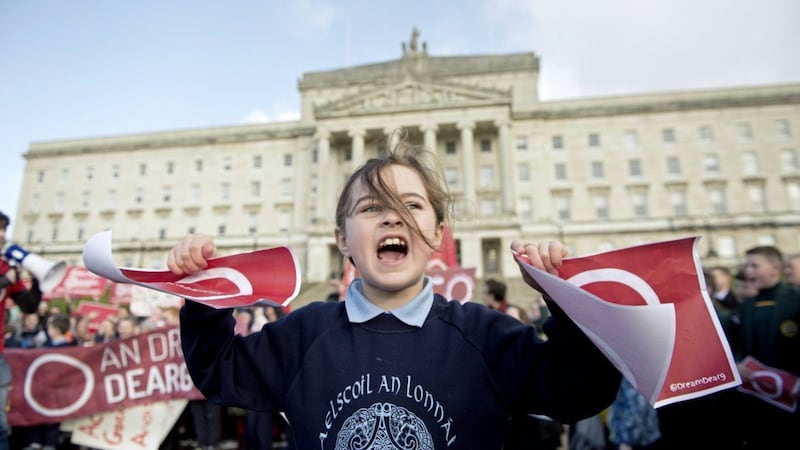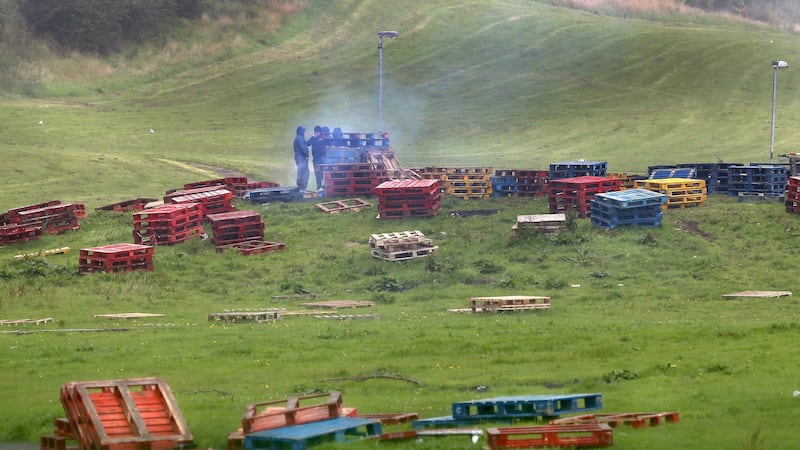Timeline: Irish language provision in Northern Ireland
:: In 1981, a weekly Irish language radio programme was first produced and broadcast on BBC Radio Ulster.
:: In 1991, the first television programme Dá mbíodh Ruball ar an Éan was broadcast on BBC Two NI.
:: In 1998 the Good Friday Agreement commits the Irish government to making Irish Language TV station TG4 available in the north and supporting Irish language production in the region.
:: In 1999, four years after legislation was passed authorising Belfast City Council to erect street signs in both the Irish and English language, the first street sign was officially unveiled at Whitestock Close (Clós na Carraige Báine).
:: In 2000, Comhairle na Gaelscolaíochta (CnaG) the representative body for Irish-medium education was set up by the Department of Education to promote, facilitate and encourage its teaching.
:: In 2001, the UK ratified the European Charter for Regional and Minority Languages with regard to Irish (and also to Ulster Scots in a more limited capacity), giving it recognition and outlining measures for its promotion in public life - including education, justice system, administrative and public authorities, media, economic, cultural and social life and transfrontier exchanges.
:: In 2005, TG4 began broadcasting from the Divis transmitter near Belfast, following agreement between the Department of Foreign Affairs and the Northern Ireland Office.
:: In the 2006 St Andrew's Agreement the British government said it "will introduce an Irish language act reflecting on the experience of Wales and Ireland and work with the incoming Executive to enhance and protect the development of the Irish language".
:: In 2006, Irish-language community radio station Raidió Fáilte began broadcasting from Belfast under a licence, having operated as a pirate radio station on a part-time basis since the 1990s.
:: In 2007, it was announced that 'Blas Ceoil', a new 10-part Irish language music series, would be launching on BBC 2 NI.
:: In 2009, Raidió Fáilte interviewed former First Minister Ian Paisley, speaking only in English during the five-to-six minute question and answer session where he discussed his long-standing interest in St Patrick and admiration for St Colomba.
:: In 2011, Sinn Féin Culture Minister Carál Ní Chuilín set up the Líofa Gaeltacht Bursary Scheme, allowing people to apply for summer courses in the Co Donegal Gaeltacht.
:: In 2012, people living in the north were able to access TG4 (along with RTÉ) via Freeview for the first time, following a deal between the UK and Irish governments.
:: In December 2016, then Communities Minister Paul Givan withdrew funding for the Líofa Gaeltacht Bursary Scheme, cited by Martin McGuinness as one of the main reasons for his resignation as Deputy First Minister the following month - leading to the suspension of devolution for three years.
:: In 2018 Belfast City Council appointed its first Irish Language Officer - the fourth council in Northern Ireland to do so.
:: In 2018 Plaid Cymru MP Liz Saville-Robert spoke in Irish in the House of Commons for the first time since 1901 as she campaigns to have an Irish language act.
:: In January 2020, the New Decade, New Approach strategy gave a commitment for legislation to promote "parity of esteem, mutual respect, understanding and cooperation" of different national and cultural identities in Northern Ireland. This was to include an Office of Identity and Cultural Expression to promote cultural pluralism and respect for diversity and support cultural and linguistic heritage. Critics warned it watered down St Andrew's Agreement commitments and fell short of an Irish language act. It would however, confer official status for the language, legal protection, an Office of the Irish Language Commissioner and repeal the 1737 Act which made it illegal to use Irish in the Courts.
:: In January 2021, Belfast City Council formally adopted a new bilingual street sign policy which saw the threshold of two-thirds of residents consent needed reduced to just 15 per cent, with a single resident or local councillor able to request the survey.
* In June 2021, Stormont passed a motion in support of plans for simultaneous translation services in Irish and Ulster-Scots in the Assembly, fulfilling part of the agreement made in New Deal New Approach.




